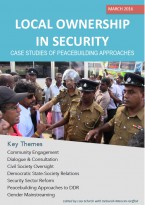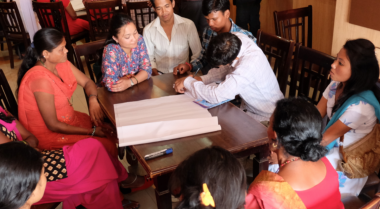
Local Ownership in Security: Case Studies of Peacebuilding Approaches
The relationship between civil society and the security sector is fundamental to human security. In many places, civilians view security forces with suspicion, perceiving them as predators rather than protectors. At the same time, many military and police also distrust civil society, questioning their intentions. Yet the security sector is a key stakeholder in the pursuit of peace. And civil society is a key stakeholder in the pursuit of security.
This report explores ways to achieve meaningful local ownership in the security sector. It provides nearly forty case studies of civil society and security actors using the principles of peacebuilding to work together towards human security. Each case study highlights the efforts that civil society and security actors have undertaken in order to reach out to each other, create collaborative processes and participatory mechanisms to solve problems related to human security in a particular local or national context. The report also tries to draw out lessons from these cases to help those who are seeking to engage with the civil society or security actors to improve human security to achieve better results. The overall purpose of gathering these case studies and identifying challenges and lessons learned is to inspire and enable others to replicate successes in peacebuilding to advance human security. This report has been developed together with Alliance for Peacebuilding and the Kroc Institute for International Peace Studies, and was funded by the Ministry of Foreign Affairs of the Netherlands and the Rockefeller Brothers Fund.
Full publication is below. Or download the handbook per module:
Chapter 1: Local Ownership in the Security Sector
In this chapter, the different concepts used in the handbook are elaborated upon.
Chapter 2: Capacity Building for Human Security
Training has a number of functions related to local ownership in security. Training play a role in capacity building for both civil society and security forces to enable basic understanding, shared terminology, and skills necessary to work together. It also plays a role in building trust and relationships between civil-society and security forces. Training often is a starting point, enabling dialogue, problem solving and more advanced levels of joint coordination for human security. Most of the case studies in this section of the report document how civil society is providing training to security forces to help them improve their community engagement strategies.
Chapter 3: Police-Community Platforms for Local Ownership
A peacebuilding approach to policing emphasises the rapport between police forces
and the communities they serve. It aims to engage local citizens as much as possible in policing policies and operations. The idea behind this approach, which puts local ownership at the centre, is that human security will improve significantly when police engage directly with civil society. Each of the following cases illustrates some of these various elements of an approach to policing that is based on local ownership.
Chapter 4: Local Ownership in DDR
DDR complements SSR/D by disarming, demobilising and reintegrating armed groups back into society. DDR contributes to human security by reducing the number of weapons and armed groups, reknitting social relationships and helping combatants transition to civilian livelihoods. Peacebuilding skills and processes can be used within DDR programs. This chapter describes four case studies where peacebuilding skills and processes support more effective DDR.
Chapter 5: Gender Mainstreaming in Security
Local ownership of security requires that all women, men, girls, boys, as well as lesbians, gay, bisexual, transsexual and intersex people (LGBTI) contribute to defining security threats and strategies. People affected by sexual and gender-based violence (SGBV) may have different security needs depending on their gender identity. The following case studies show how peacebuilding organisations approach SGBV and the inclusion of women in different contexts.
Chapter 6: National Level Platforms for Local Ownership
Earlier chapters in this volume illustrate the creative and inspiring work to improve local ownership. This chapter explores national-level case studies of efforts to improve local ownership and human security. The case studies generally fit into three categories - national security challenges, national peace councils, and joint institutional oversight - with some efforts indicating more robust levels of local ownership than others.
Chapter 7: Common Challenges and Lessons Learned
Some common patterns and themes emerge from the case studies providing insights into
how peacebuilding organisations address the challenges they encounter on the ground. This chapter draws out the challenges and lessons learned identified in the case studies.


